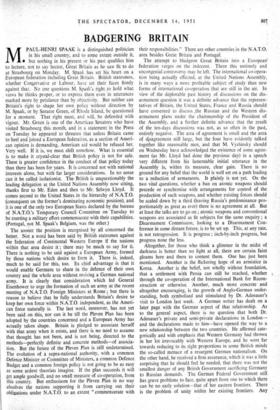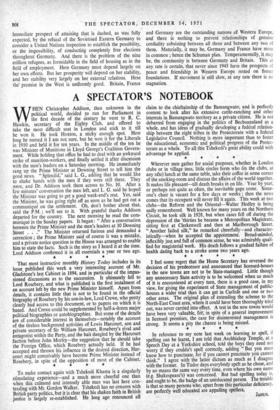BADGERING BRITAIN
MPAUL-HENRI SPAAK is a distinguished politician in his small country, and to some extent outside it. • but nothing in his present or his past qualifies him to lecture, not to say hector, Great Britain as he saw fit to do at Strasbourg on Monday. M. Spaak has set his heart on a Europe_an federation including Great Britain. British statesmen, whether Conservative or Labour, have set their faces firmly against that. No one questions M. Spaak's right to hold what views he thinks proper, or to express them even in utterances marked more by petulance than by objectivity. But neither can Britain's right to shape her own policy without direction by M. Spaak, or by Senator Green, of Rhode Island, be questioned for a moment. That right must, and will, be defended with vigour. Mr. Green is one of the American Senators who have visited Strasbourg. this month, and in a statement in the Press on Tuesday he appeared to threaten that unless Britain came to heel and joined a European federation, as a section of Ameri- can opinion is demanding, American aid would be refused her. Very well. If it is, we must shift somehow. What is essential is to make it crystal-clear that British policy is not for sale. There is greater confidence in the conduct of that policy today than there has been for years. It is concerned not with national interests alone, but with far larger considerations. In no sense can it be called isolationist. The British is unquestionably the leading delegation at the United Nations Assembly now sitting, thanks first to Mr. Eden and then to Mr. Selwyn Lloyd. It comes second to the United States in the hierarchy of N.A.T.O. (conseqUent on the former's dominating economic position), and it is one of the only two European States declared by the bureau of N.A.T.O.'s Temporary Council Committee on Tuesday to be exerting a military effort commensurate with their capabilities. (Portugal, not M. Spaak's Belgium, was the other.) The sooner the position is recognised by all concerned the better. Not a word has been said by British statesmen against the federation of Continental Western Europe if the nations within that area desire it ; there may be much to say for it. There is nothing to be said against a European Army, formed by those nations which desire to form it. There is, indeed, much to be said for this, too. Its chief advantage is that it would enable Germans to share in the defence of their own country and the whole area without reviving a German national army. It is clearly that consideration which led General Eisenhower to urge the formation of such an army at the recent meeting of N.A.T.O. Foreign ,Ministers at Rome ; but there is reason to believe that he fully understands Britain's desire to keep 'her own force within N.A.T.O. independent, as the Ameri- can force naturally is. The last word, moreover, has not yet been said on this, nor can it be till the Pleven Plan has been adopted by the countries concerned and a European Army has actually taken shape. Britain is pledged to associate herself with that army when it exists, and there is no need to assume that thought has not been, and is not being, directed to the methods—perfectly definite and concrete methods—of associa- tion. But the future of the Pleven Plan is still undetermined. The evolution of a supra-national authority, with a common Defence Minister or Committee of Ministers, a common Defence Budget and a common foreign policy is not going to be as easy as some ardent theorists imagine. If the plan succeeds it will get ample goodwill, and no sinall measure of co-operation, from this country. But enthusiasm for the Pleven Plan in no way absolves the nations supporting it from carrying out their obligations under N.A.T.O. to an extent "commensurate with their responsibilities." There are other countries in the N.A.T.O. area besides Great Britain and Portugal.
The attempt to bludgeon Great Britain into a European' federation verges on the indecent. There this untimely and uncongenial controversy may be left. The international co-opera- tion being actually effected, at the United Nations Assembly. is in many ways a more profitable subject of study than new forms of international co-operation that are still in the air. In view of the deplorable past history of discussions on the dis- armament question it was a definite advance that the represen- tatives of Britain, the United States, France and Russia should have consented to discuss ,the Russian and the Western dis- armament plans under the chairmanship of the President of the Assembly, and a further definite advance that the result of the ten-days discussions was not, as so often in the past, entirely negative. The area of agreement is small and the area of disagreement still large, but the four have evidently talked together like reasonable men, and that M. Vyshinsky should on Wednesday have acknowledged the existence of some agree- ment (as Mr. Lloyd had done the previous day) in a speech very different from his lamentable initial utterance in the Assembly is, within its measure, clear gain. There is no ground for any belief that the world is well set on a path leading to a reduction of armaments. It plainly is not yet. On the two vital questions, whether a ban on atomic weapons should precede or synchronise with arrangements for control of the production of such weapons, and whether existing forces should be scaled down by a third (leaving Russia's predominance pro- portionately as great as ever) there is no agreement at all. But at least the talks are to go on ; atomic weapons and conventional weapons are associated as fit subjects for the same enquiry ; a Disarmament Commission, looking to a Disarmament Con- ference in some distant future, is to be set up. This, at any rate, is not retrogression. It is progress ; inch-by-inch progress, but progress none the less.
Altogether, for those who think a glimmer in the midst of darkness is better than no light at all, there are certain faint gleams here and there to content them. One has just been mentioned. Another is the flickering hope of an armistice in Korea. Another is the belief, not wholly without foundation, that a settlement with Persia can still be reached, whether through the co-operation of the International Bank for Recon- struction or otherwise. Another, much more concrete and altogether encouraging, is the growth of Anglo-German under- standing, both symbolised and stimulated by Dr. Adenauer's visit to London last week. A German writer has dealt on a later page with the German aspect of that relationship. As to the general aspect, there is no question that both Dr. Adenauer's private and semi-private declarations in London— and the declarations made to him—have opened the way to a new relationship between the two countries. He affirmed cate- gorically and with emphasis that Western Germany had thrown in her lot irrevocably with Western Europe, and he went far towards reducing to its right proportions in some British minds the so-called menace of a resurgent German nationalism. On the other hand, he' received a firm assurance, which it was a little surprising that be should feel he needed, that there was not the ;smallest danger of any British Government sacrificing Germany to Russian demands. The German Federal Government still has grave problems to face, quite apart from one to which there can be no early solution—that of her eastern frontiers. There is the problem of unity within her existing frontiers. Any, immediate prospect of attaining that is dashed, as was fully expected, by the refusal of the Sovietised Eastern Germany to consider a United Nations inspection to establish the possibility, or the impossibility, of conducting completely free elections throughout Germany. And there is the problem of the nine million refugees, as formidable in the field of housing as in the field of employment. Here Germany must depend largely On her own efforts. But her prosperity will depend on her stability, and her stability very largely on her external relations. Here the- promise in the West is uniformly good. Britain, France and Germany are the outstanding nations of Western Europe, and there is nothing to prevent relationships of genuine cordiality subsisting between all three and between any two of them. Materially, it may be, Germany and France have more in common ;-hence the Schuman plan. Temperamentally, it may be, the community is between Germariy and Britain. This at any rate is certain, that never since 1945 have the prospects of peace and friendship. in Western Europe rested on firmer foundations. If movement is still slow, at any rate there is no stagnation.







































 Previous page
Previous page